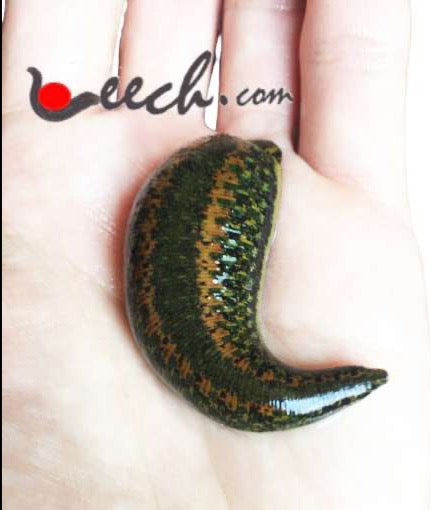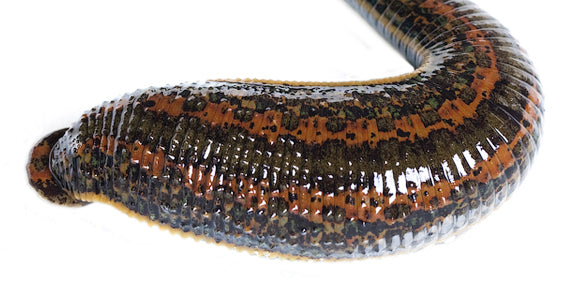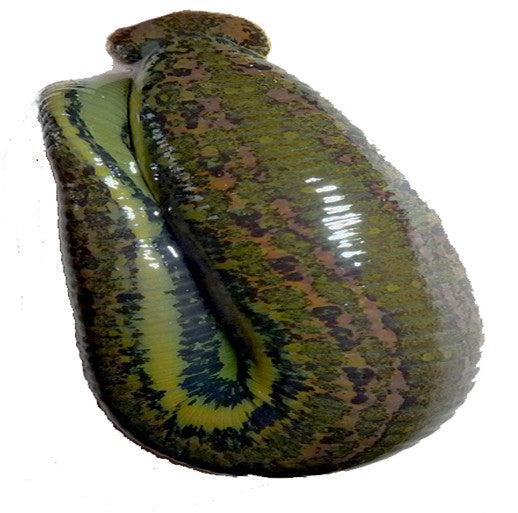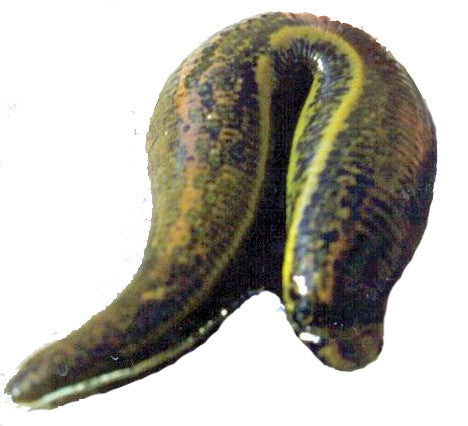
LIVE Hirudo Leech (Hirudo). The large leech is our second most popular leech product in the shop. Hirudotherapy patients with more urgent need of therapy choose the large leech due to its size and ability to suck more blood. Large leeches suck 5 times more blood than small leeches. The afterward blood-oozing also lasts longer. They will enlarge tremendously and if kept at home and given proper care, leeches will be able to be re-used on the same patient, in just 3 to 6 months. Being older, large leeches are more experienced and able to de-clot and thin the blood faster, by forming a good, clean sucking channel. Their abilities makes them tremendously good in improving the microcirculation of tissues and re-building the capillary structures. The hirudotherapy process using large leeches involves a minimal amount of pain or discomfort, as compared to their small counterparts. Large leeches inject larger amounts of Hirudin, Painkillers and Antibiotics, making hirudotherapy with them easier and more comfortable, as well as much faster than the rest of the leech sizes. Large leeches are extremely easy to take care of, being very resilient, they have the highest survival rates and live longer. They are also slower to move, making them harder to run away or escape. The muscular large Hirudo leech on the other hand is quite agile and possesses a strong instinct to sense problem areas on the body that need attention. Best use for the large leech is for illnesses and conditions that have been long-standing and deeply-rooted. It is best to apply this leech to areas and parts of the body that have thicker skin, such as the lower part of the legs below the calf muscles as well as on the upper back, among other locales.
 UPON ARRIVAL: Immediately transfer your leeches out of the container with special gel and into a jar of cold water!
UPON ARRIVAL: Immediately transfer your leeches out of the container with special gel and into a jar of cold water!
HOW TO GET THEM OUT: Pour out the gel with the leeches from the container. If the leeches are still inside, you may add a bit of cold water and swoosh everything around vigorously. If they are still stuck to the walls, you may try to use your fingers. Regular tweezers may harm the body of the leech, so they are not recommended for use - its best to purchase the recommended leech forceps used for easy removal and handling of the leech. In the absence of forceps, be sure to handle your leeches quickly, so they don’t start sucking blood from your fingers.
BEST CONTAINER TO USE: Keep your leeches in a large glass (or plastic) jar with a tight lid. The container needs to be filled about 1/3 full of ice-cold water. The lid needs to be closed and you may puncture needle-size holes in it. Alternatively, instead of a lid, you may cover your jar with cloth tied with an elastic band.
CARE: Change the leech-water at least once a week. Dump out old water by shaking it around vigorously first, with the lid on, until the leeches’ skins come off (they shed their skins about once a week). Skins appear as slimy whitish-clear particles, floating in the water. Carefully pour-out the old water with skins, taking care not to pour out any of the leeches, then, refill the jar again, close and shake. Repeat this process as many times as needed, until all the skins are completely gone and the water is perfectly clear. Fill the jar again with 1/3 cold water (its ok to use tap) and close the lid tightly.
Keep your jar with leeches in a cold, partly dark place, away from direct sunlight. During winter, they can be kept outdoors, partly-covering the jars with a towel, to protect from full sun-exposure. We do not advise you to feed your leeches during winter. Leech species can keep for 1 year without feeding. Keep your fed leeches apart from the hungry ones, as they will prey on each other. Be sure to purchase separate jars, to separate your fed and hungry leeches properly.



